Being remembered and being forgotten
If I say for example that "Salomon and Lydia were almost forgotten when I created the website", I mean it litterally. Almost no one had a personal memory of Lydia, absolutely no one had it of Salomon. Very few of their descendants knew their names: they were forgotten.
On the other hand: when we say that an actor, a singer or an author is "forgotten" or that "no one remembers him" we don't mean it that way! An actor can be remembered by 100.000 people and still be "forgotten". It just means that there are almost no articles in the media about him, or that very few people talk about him nowadays. How come this difference? Being remembered and being talked about is not the same thing.
Three of Greta's children...
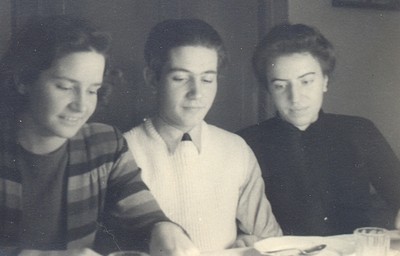
...gathered in Värnamo 1939: Else, Christian and Margaret Andersen. Because both their parents were dead, they had come to live with Anna and Helge.
Margaret "Maggie" (1918-1991) came to Sweden when she was 15 and had her education here. She eventually returned to the US where she worked as an accountant. She married Frank Finnell and had the children Robert, Anna and William. The later part of her life she lived in Olympia, Washington.
Christian "Chris" (1924-2009) came to Sweden, 13 years old, and eventually returned to the US. He married Eleanor and had the daughter Paula. The later part of his life he lived in Myerstown, Pennsylvainia. Otherwise I know very little about him.
Else (1924-2009) came to Sweden with Chris and stayed here for the rest of her life. She married her second cousin Folke Wennberg and had the children Anita, Christian and Björn. The later part of her life she lived outside Stockholm. I met her several times; she was always positive (at least on the surface), always encouraging. From what I understand, all her male cousins fell in love with her. Jennifer Ring says (after meeting Else in Sweden 2006): "Else was a woman with a real sparkle inside, a fire even. She was one of a kind."
This is Thomander's student's hostel in Lund...
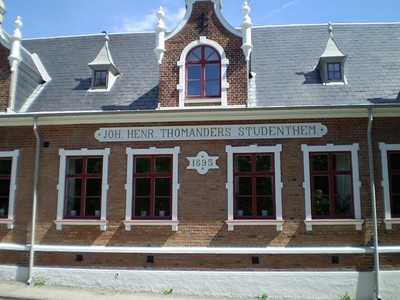
...where Lydia was the matron 1914-1922. We know that she had difficulties during this time. In the essay about his grandmother, Gösta Wennberg tells us that "there often were conflicts between grandma and the students" and that "this was not really a good choice of work for such a quick-tempered person".
In a jubilee publication about the hostel 1895-1945 a former inhabitant, Yngve Plym Forshell, writes about this:
Part of the complaining (about the food) was addressed to the matron Mrs Lindman, disrespectfully called "the girl". She was not really able to cope with the lack of material resourses, and despite her charm and social competence she lacked something very important in dealing with a group of students: an understandig and indulgent sense of humor. Dealing with our matron, I am sorry to say, we often didn't follow gentlemen's agreement.
Gösta's comment: "Poor Grandma! Mom tells us about her bad temper and lack of humor, in describing the emancipation years of the girls, as she had constant conflict at home with Greta and Kerstin."
Myself I must admit that Lydia's difficulties in dealing with other people is one of the reasons why I find her interesting. If a person is complicated, there is more of a challenge in understanding her.
Congratulations Mom...
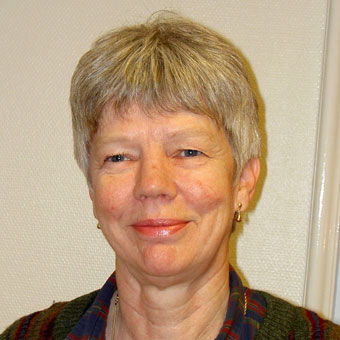
...65 years old today! This is the age for retirement in Sweden, but my mom will continue to work half-time, mostly as a fellow advicer but also as a marriage counselor. She will now have more time for a lot of things, such as reading books, socializing with her grandchildren - and writing family history!
This photo...

...was sent to me by Taeko, Dick's daughter-in-law. Some of the more primitive inhabitants at 25 Princess Boulevard.
Gösta Wennberg on dreams
GÖSTA WENNBERG
Y LOS SUENOS SUENOS SON (Och drömmar är drömmar)
Tomas Tranströmer skriver om konstnären
som inte längre känner mångfalden
Men den som fortfarande kan drömma
har ingen orsak att känna saknad
Drömmen sänker dig i sig
med sin egendomliga stämning
en glidande tidsupphävande djupspegling
där du befinner dig i det ständigt föränderliga
laddat av mening och avsikter men du vet inte vilka
Igenkännandets rum och landskap där du aldrig varit
Men som bara angår dig fastän de aldrig funnits
Döda och saknade kommer emot dig
men du kan inte nå dem
Du talar med dem, de visar vilja
men du vet att de är döda
Detta är egentligen inte att förstå
du kan inte avfärda drömmen
inte ens när dagen kommer och solen stiger
du glömmer den lätt men den har funnits där
i sin glidande mångfald har du skapat den
den har skapats i dig av dina minnen
och ändå aldrig funnits
Den är välkänd och okänd
Den är inte utanför dig, det är ingen spådom
det är en dröm ingenting annat
men den utsäger någonting om verkligheten
något undanglidande som du aldrig når.
GÖSTA WENNBERG
Y LOS SUENOS SUENOS SON (And Dreams are Dreams)
Tomas Tranströmer writes about the artist
who no longer feels diversity
but someone still able to dream
has no reason to mourn
The dream lets you sink into itself
in its peculiar atmosphere
without time, a sliding reflection of the dept
where you are in what’s ever changing
filled with purpose and intentions which you don’t know
the familiar room and scenery where you’ve never been
just of interest to you although they never existed
The dead and missed come towards you
but you cannot reach them
you talk to them, they show interest
but you know that they are dead
This is not really to understand
you cannot dismiss the dream
not even when the day come and the sun rises
you easy forget it but it was there
in its sliding diversity you created it
it was created in your mind by your memories
still it never existed
it is well known and unknown
It is not outside you, it is not a prophecy
it is nothing but a dream
but it conveys something about reality
something elusive which you will never grasp.
I have a new blog...
Swedish but of course you can make comments (or ask questions) in English.
This is God

Lydia's mother Mathilda indeed believed in him. Lydia believed in him. My great grandmother Anna wanted to belive in him. Her son Gösta did not believe in him. My grandmother Brita was not really interested in him. Myself I believe, that in order to discuss him, you first of all need to define him.
A winter picture from yesterday
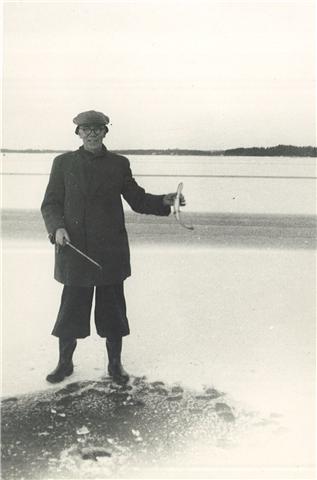
My great grandfather Helge jigs, probably in the lake Furen.
My great grandmother Anna...

...photographed with her favourite sister Ellen in 1896. Interesting how the clothing culture has changed. Back in those days, youngsters were often dressed up to look older. Today it's a compliment to say that "your clothes make you look younger".
This photo...

...taken in August last year, shows Jennifer Ring with her mother Helen, 82, playing some game at the farm of Kerstin Ring and her husband Michael. The farm is located near a village between Toronto and Ottawa.
Helen Ring, Ted's wife during some 20 years, is quite a character whom I had the pleasure to meet when I was in Canada in July. I remember her sitting by the computer making humorous postcards, adding people's faces to different kinds of bodies. Helen is known for being very straightforward; she told me, very frankly, about the not-so-fun time in your life when you get old. That I appreciated.
I also appreciated her (serious and a little drastic) sense of humour. Older people can have a lot of qualities but - to be honest - it's not very often that I find them funny. A big hug to you!
Ted Ring (1926-1973)
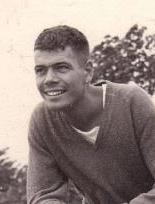
The first time that I heard of Ted Ring was when I sat with my grandmother by the beach at Skeda in a summer evening of the 80's. She then told me about the cousins of her who came to Sweden when they were children; she also mentioned to me that one of them was now dead. This is all I remember from that conversation. I don't think that my grandmother had any knowledge about Ted's children.
But in 2006 Ted's daughter Jennifer contacted my mother and wanted to visit us at Skeda. This was the time when I really got to know about him. My image of him, after all that I have heard, is of a manly, nature-loving, boyish man, in a woman's eyes exciting. And unstable as many other people in our family.
His brother Dick describes him as "a very fine photographer who worked at times with a couple of well-known artists in Canada. He was very interested in nature, was a fine teacher at the Toronto Island Public School. I have met some of his pupils through his daughter Jennifer and they thought very highly of him as a teacher. It seemed Ted was ahead of his time in environmental concerns and teaching his pupils about nature."
This is confirmed by his former pupil from the 4th grade, Eric Light, who tells us in the guestbook (June 2008) that Ted was an "outstanding teacher whose love of nature and art stay with me today, 51 years later." So maybe when describing him, we should also use the word charismatic.
